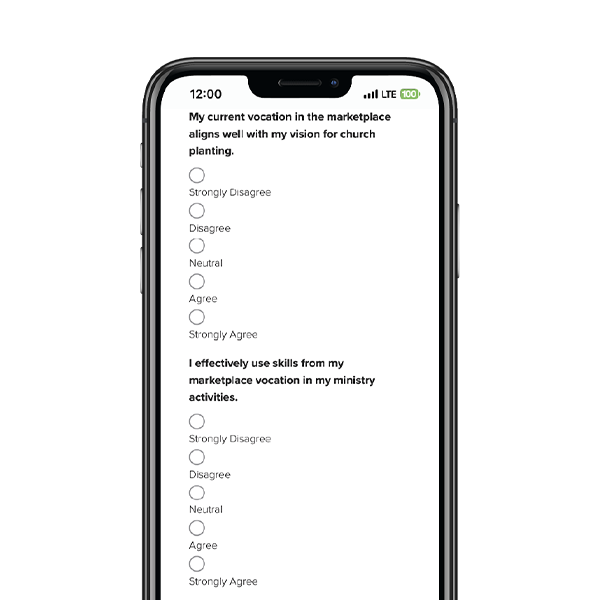Developing leaders is rarely easy (or fast). It takes time — sometimes years — to discover and develop future church planters within your congregation.
Your church provides fertile soil for the discovery of future leaders and some of the best training ground for their development. Current leaders in the church must assume the responsibility for both recognizing and exhorting young leaders to the vital work of church leadership.
But where do you find potential planters in your church? What qualities should you look for? How do you start a residency for your leaders?
Where do you find potential planters?
-
Look among those who lead their families well.
If a father in your church leads his wife and children well, he already has a strong foundation for shepherding others well. How could you encourage these men to extend their influence by shepherding others?
-
Look among those who lead small groups well.
Small groups can be a lot like small congregations. If you see someone shepherding their small group well, making disciples and even multiplying, tell them what you see and encourage them to consider why God has gifted them in those ways.
-
Look among those who members in your church look up to.
Who in your church do others look to for humble, godly leadership? Is there a deacon, elder or staff member who shepherds others well? If so, encourage them and give them additional opportunities to lead. You never know how that may move them to consider pastoral ministry and/or church planting.
-
Look among those who lead businesses well.
It may be obvious, but high-capacity leaders have a high capacity for leadership. Don’t be afraid to approach a strong, godly leader in your church just because they’re busy leading a business. They may be excited to use their experience and abilities for kingdom expansion.
-
Look among those who lead in the community well.
Are there godly people within your congregation the broader community looks to for leadership? Do you think anyone has ever challenged them to use their influence to start a new congregation? Help them catch a vision for how God could use them and then help them take steps toward church planting.
-
Look around you.
Look around you with fresh eyes. Look to see where God is already at work among the leaders He already has given you. You’re not going to find what you’re not looking for, so look intently within your congregation for potential church planters.
What qualities do I look for in potential church planters?
It’s easy to assume we know who God is calling to be a church planter. Like Samuel in search of the next king is Israel, we’re easily enamored by external characteristics. Gifting is important, but we must not overlook the qualities that are only observed through time.
But before we identify these leaders, the emphasis should be on whether they’re biblically qualified according to 1 Timothy 3:1–7 and Titus 1:6–9. In other words, do they meet the following characteristics:
- aspire to the office
- live above reproach
- have one wife (if married)
- practice discipline and not a drunkard
- live self-controlled
- respectable
- hospitable
- able to teach
- not violent
- gentle
- not quarrelsome
- not lovers of money
- a good manager and steward of his household
- not a recent convert
- thought well by outsiders
- a lover of good
- holy
If they meet these qualities, you can assume they may be worth investing in and equipping. Don’t spend too much time focusing on whether they’re called. Train and equip them through a residency of some sort. Calling usually works itself out through circumstances and opportunity.
There are plenty of other traits that will serve future planters well. The biblical ones listed above should be seen as non-negotiables. The following questions are additionally important to consider (but perhaps don’t hold the same weight):
- Are they a starter and/or risk-taker?
- Do others naturally follow them?
- Do they seem emotionally healthy?
- Do they value working with a team?
- Do they relate well with those outside the church?
- Are they good communicators?
- If married, does their spouse support them?
Starting a residency for potential planters
Once you’ve identified key leaders in your church, give good time to training them. In Ephesians 4:12-16, Paul says the role of an elder, in part, is to equip the saints for the work of ministry.
“And he gave the apostles, the prophets, the evangelists, the shepherds and teachers, to equip the saints for the work of ministry, for building up the body of Christ,” (Ephesians 4:11-12)
One common way to equip future church planters is through residencies.

There’s plenty of helpful advice on how to start a residency. Here a few brief suggestions as you begin:
- Keep it simple. In the beginning, don’t pay your residents. If you’re just starting out, don’t make it expensive. Keep it simple, first. If you train the guys in your church, they likely already have jobs.
- Create a syllabus (instead of a curriculum). Every pastor has something to each and pass on to their leaders. Teach what you know (i.e. how to schedule your week or how you study to prepare a sermon). Start with the books, articles, and diagrams that have had an impact on your walk with the Lord and leadership.
- Teach them holistically. Stimulate what their heart (inspire them), their head (intellectually inform them) and their hands (give them the gift of experiences).
- Learn from others. Find smaller churches in your area that have been doing residencies for longer and learn from them. Ask them what they’ve done and what resources they’ve used.
Find more resources for Sending Churches to help support their planters and planting teams.
Published February 21, 2022




